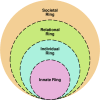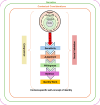The impact of death and dying on surgeons in a tertiary cancer centre in Singapore
- PMID: 40325449
- PMCID: PMC12051349
- DOI: 10.1186/s12893-025-02881-1
The impact of death and dying on surgeons in a tertiary cancer centre in Singapore
Abstract
Background: Demands upon surgeons are increasing, especially in the care of the terminally ill. Fronting patient care, supporting families and guiding multi-disciplinary care teams facing the loss of patients see surgeons experiencing moral distress, compassion fatigue, vicarious trauma and secondary traumatic stress with the blurring of professional and personal boundaries. The full extent of these 'costs of caring' upon a surgeon remains unclear despite evidence of their compromises to patient care. To understand the costs of caring, semi-structured interviews are proposed to achieve the primary aim of understanding 'What is known about the costs of caring on surgeons in Singapore?' and the secondary aim, 'What is the impact of the costs of caring on a surgeon's professional identity?'.
Methods: Twelve surgeons of various subspecialties from a tertiary cancer centre in Singapore were interviewed between 21st June 2022 and 18th December 2023. Transcripts were analysed using Krishna's Systematic Evidence-Based Approach.
Results: The key domains identified were: (1) motives for surgical career; (2) forms of emotional distress experienced; (3) impact of challenging experiences on personhood; and (4) buffer mechanisms.
Conclusions: The costs of caring impact surgeons' professional identities; shape their 'internal compasses' or the way they deliberate and assess their responsibilities; and influence patient safety and family support. The costs of caring and the 'internal compass' are moulded by the surgeon's traits, maturing competencies, growing insights, clinical experience and sociocultural context. Without holistic, longitudinal and personalised support in both the personal and professional spheres, the costs of caring compromise surgeons' confidence and professional identities.
Keywords: Burnout; Compassion fatigue; Costs of caring; Death and dying; Moral distress; Secondary traumatic stress; Surgeons; Surgery; Vicarious trauma.
© 2025. The Author(s).
Conflict of interest statement
Declarations. Ethics approval and consent to participate: This study adhered to the ethical principles outlined in the Declaration of Helsinki and was approved by the SingHealth Combined Institutional Review Board Ethics (approval number: [2021/2176]). All participants provided written informed consent and measures were taken to protect their privacy and confidentiality. Potential risks and benefits were carefully considered and disclosed to participants throughout the study Consent for publication: All participants provided written informed consent. Competing interests: The authors declare no competing interests.
Figures




Similar articles
-
The impact of death and dying on the personhood of senior nurses at the National Cancer Centre Singapore (NCCS): a qualitative study.BMC Palliat Care. 2022 May 20;21(1):83. doi: 10.1186/s12904-022-00974-9. BMC Palliat Care. 2022. PMID: 35590293 Free PMC article.
-
Moral Distress and the Cost of Caring Amongst Medical Oncologists in Singapore.Am J Hosp Palliat Care. 2025 Mar 27:10499091251330607. doi: 10.1177/10499091251330607. Online ahead of print. Am J Hosp Palliat Care. 2025. PMID: 40146930
-
Towards a Clinically Relevant Appreciation of the Cost of Caring: A Study of Palliative Care Physicians in Malaysia.Am J Hosp Palliat Care. 2024 Nov 7:10499091241298281. doi: 10.1177/10499091241298281. Online ahead of print. Am J Hosp Palliat Care. 2024. PMID: 39508141
-
Experiences of healthcare professionals providing palliative care in home settings - a scoping review.BMC Palliat Care. 2025 Mar 28;24(1):83. doi: 10.1186/s12904-025-01728-z. BMC Palliat Care. 2025. PMID: 40155860 Free PMC article.
-
Combating stress and burnout in surgical practice: a review.Adv Surg. 2010;44:29-47. doi: 10.1016/j.yasu.2010.05.018. Adv Surg. 2010. PMID: 20919512 Review.
References
-
- Wu HY, Kei AL, Onn IL, Hwang MK, Chan S. Older adults’ attitudes to death, palliative treatment and hospice care: A view from Singapore. Palliat Med. 2006;20(2):117–8. - PubMed
-
- Teo P, Chan A, Straughan P. Providing health care for older persons in Singapore. Health Policy. 2003;64(3):399–413. - PubMed
-
- Chong JA, Quah YL, Yang GM, Menon S, Krishna LKR. Patient and family involvement in decision making for management of cancer patients at a centre in Singapore. BMJ Support Palliat Care. 2015;5(4):420–6. - PubMed
-
- Lee A, Wu HY. Diagnosis disclosure in cancer patients–when the family says no! Singap Med J. 2002;43(10):533–8. - PubMed
MeSH terms
Grants and funding
LinkOut - more resources
Full Text Sources
Medical

